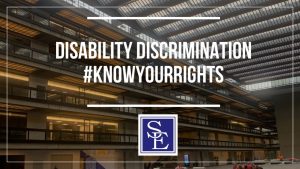The Superior Court in New Jersey’s Appellate Division has rejected an employer’s attempt to overturn a Somerset County jury verdict finding it liable for creating a hostile work environment based upon an employee’s disability. In the case Joseph Iko v. County of Middlesex, the Appellate Division took specific note of the overwhelming testimony of the employee’s co-workers induced at trial corroborating the employee’s claims that he was the subject to frequent verbal taunts while at work concerning his diabetes and other related medical problems. Based upon the trial evidence, the court found that the jury rightfully applied the facts of the ongoing harassment in finding that the employee was subjected to an unlawful hostile work environment and affirmed the verdict. In doing so, the court rejected the employer’s argument that the employee had to provide expert testimony regarding the exact qualities of his or her disability in order to proceed with his claim of a hostile work environment.

In this case, the plaintiff Mr. Iko was employed by the Middlesex County Sheriff’s Office from 1992 until his retirement in 2017. Mr. Iko was diagnosed with Type I Diabetes early in life and had to manage his symptoms throughout his entire adult life. At times the illness caused Mr. Iko to experience related medical issues that required him to take time off from work for surgical procedures. On one occasion, Mr. Iko had to undergo a pancreas transplant procedure, which was complicated by an aortic tear. Mr. Iko also experienced issues with his eyesight.
In addition to struggling with numerous medical issues, Mr. Iko faced severe and pervasive discrimination from his supervisors and coworkers on the basis of these disabilities. Several of Mr. Iko’s supervisors and coworkers referred to him as “Eye Lab”, “Half-Dead”, “Mr. Magoo”, “Stevie Wonder” and “Walking Dead”, among other such names. These nicknames were offensive to Mr. Iko, who repeatedly asked the harassers to stop. Mr. Iko’s supervisors also directed expletives and derogatory statements toward him related to his failing pancreas and eyesight. Mr. Iko attempted to lodge a formal complaint of harassment with the Sheriff, but his Captain told him that the Sheriff would not speak with him. Unable to address the ongoing discrimination and harassment internally, Mr. Iko felt he had no choice but to file a lawsuit against Middlesex County for disability discrimination.
 New Jersey Employment Lawyers Blog
New Jersey Employment Lawyers Blog

